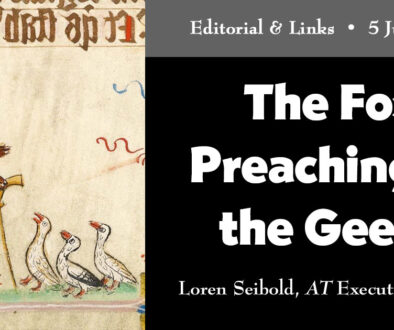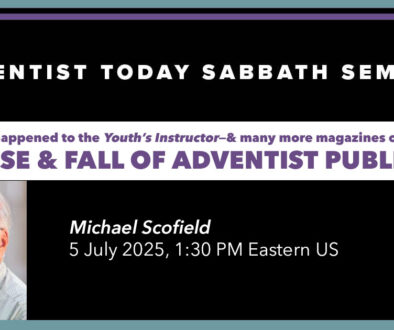ATSS: Michael Scofield, “Primitive Adventist Culture & Theology as Seen in Early Church Journals”
7 February 2024 |
For the past 180 years, the Seventh-day Adventist church has published a notably high volume of journals: over 1.3 million pages containing valuable clues about both official and grass-roots theology, culture, and anxieties. Official theology has changed through the years (as should be expected). Indeed, in spite of official doctrinal pronouncements, there is a wide range of beliefs found in the average members today.
The Review & Herald, first published 1850, offers a glimpse into the culture of early Adventism. Its pages showed a remarkable level of candor about the business and finances of the early Advent movement, including travel expense reports of the leaders, and vigorous debates about the smallest point of Biblical interpretation and “sub-doctrine.” In early years, the majority of published space focused upon the Sabbath doctrine, first obsessing about the proper day, and later debating proper Sabbath-keeping.
Through all this ran a sense of urgency about the soon-ness of the second coming. Stiff legalism drowned out any affirmation of God’s love and grace. No wonder early saints were anxious about unconfessed sins!
Mining the obituaries in particular allows us to trace the geographic spread of Adventism from New England across to the upper Midwest, while neglecting the American Deep South until after the Civil War. The obituaries reveal much about grass-roots theology as written by family members and local ministers. We see a number of points of anxiety: a need to demonstrate that the deceased led a good life—good enough to be accepted by God and appear in “the first resurrection.”
Stoicism in the face of pain, suffering, and impending death was also praised in the text. The obituaries also give us useful metrics on cause of death, age, and the size of families. Fortunately for us, all these pages are freely available on the General Conference archives website, and ripe for further exploration and mining.
Teacher:
Michael Scofield, M.B.A. is an expert in data asset management, speaking all over the U.S. and the UK on topics of data quality and data visualization. He has served on several denominational committees on church structure and finance. He has spoken over 150 times to various classes and church audiences about the history and sociology of Adventism.
Moderator:
Raj Attiken is a retired president of the Ohio Conference, now an adjunct professor at Kettering College.
How to join:
One-click link: https://us06web.zoom.us/j/83460840916
Passcode: ELLENWHITE
ATSS starting time depends on where you are. If you’re on the west coast of the United States, it’ll be 10:30 AM. On the east coast, 1:30 PM. Times in Europe, Africa, and elsewhere will vary with local time changes. Please double-check the correct time where you live.
The class is intended to last about 2 hours, though the conversation often continues to 4 PM (Eastern time).
About our class:
- The AT Sabbath Seminar is intended to be a courteous forum. We discuss and ask questions politely. We don’t accuse, get angry, put people down, or judge the state of their salvation.
- Stick to the topic in both comments and chat discussion.
- Make your comments and questions short—don’t dominate.
- Keep your microphones muted unless you are called upon to make your comment or ask your question.
- Indicate your interest in speaking by raising your electronic hand—under the “reactions” button.
- Please use your name when you sign in! Not your phone number, not your initials. This will help us differentiate you from unwelcome guests who want to disrupt us. You can set your name after signing on by clicking on the 3 dots next to your picture, which drops down a menu.
We look forward to getting acquainted with you!
YouTube channel:
You can see all of our previous ATSS recordings here.
Coming up:
- Stephen Chavez
- Kart Lazic
- Denis Fortin
- Andreas Bochmann
- Jim Walters
- Tom deBruin
- Reinder Bruinsma




